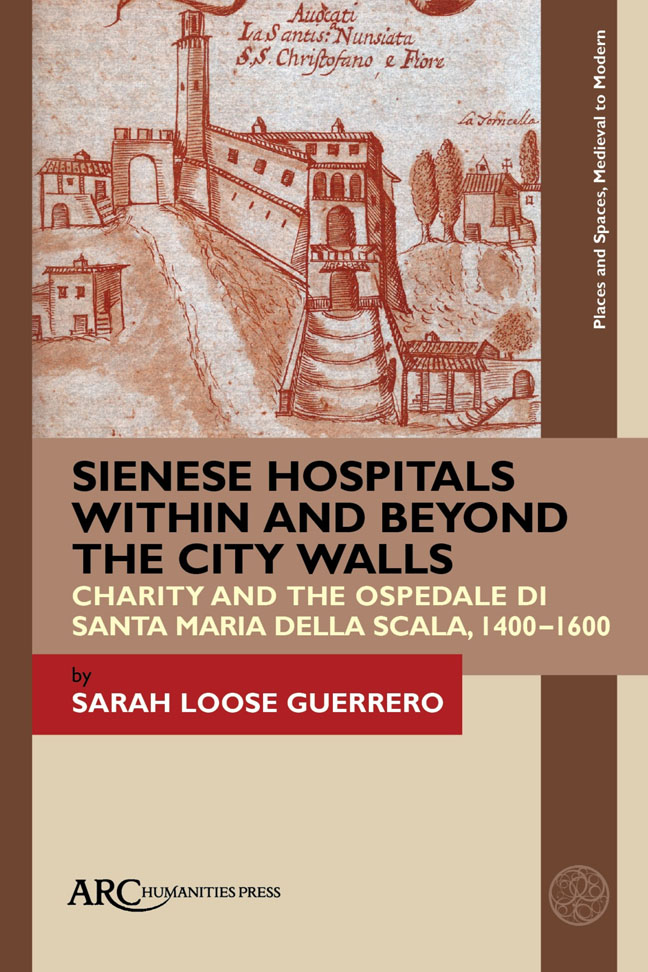 Sienese Hospitals within and beyond the City Walls
Sienese Hospitals within and beyond the City Walls Published online by Cambridge University Press: 17 February 2024
In 1477 the hospital of San Giacomo in Castel della Pieve, a small town on the border of Tuscany and Umbria, expressed a desire to be “incorporated and united with the Spedale of Santa Maria della Scala di Siena.” This request was supported by the local community, which declared that it “wished to give [the hospital of San Giacomo] to the hospital of Siena.” Santa Maria della Scala agreed to Castel della Pieve's petition, and the spedale of San Giacomo became a member of the hospital's network. This meant that Santa Maria della Scala appointed the hospital's rector and that San Giacomo paid an annual censo to recognize its status as part of the larger organization. Aside from these interactions, however, Santa Maria della Scala was largely uninvolved in San Giacomo's affairs and only took a closer interest when serious complaints or problems arose. For its part, San Giacomo benefitted from privileges granted to Santa Maria della Scala, as well as the support of a large, powerful urban institution. San Giacomo became the tenth spedale in a group that included hospitals located in Florence, Poggibonsi, San Gimignano, San Miniato, Barberino, Monte San Savino, Rieti, Todi, and Acquapendente, each of which were similiarly bound to Santa Maria della Scala.
San Giacomo and the other nine hospitals like it were referred to as spedali di fuori, or “outside hospitals,” because of their location outside the boundaries of the Siena's political state. The physical and political distance of spedali di fuori from Siena distinguished them from the rural hospitals on the grance, as did their relationships with the central institution. Santa Maria della Scala owned and directly operated subject hospitals within Siena's contado, but aside from appointing leadership it generally lacked involvement in the day-to-day operations of spedali di fuori. Most spedali di fuori further differed from the rural hospitals in Santa Maria della Scala's network because they were in small cities and towns rather than the countryside. Rural subject hospitals in the Sienese state offered Santa Maria della Scala the opportunity to expand its charitable activities beyond city walls, gave the hospital a foothold in communities where it later acquired substantial property holdings, and helped create ties between Siena and its subject territory.
To save this book to your Kindle, first ensure [email protected] is added to your Approved Personal Document E-mail List under your Personal Document Settings on the Manage Your Content and Devices page of your Amazon account. Then enter the ‘name’ part of your Kindle email address below. Find out more about saving to your Kindle.
Note you can select to save to either the @free.kindle.com or @kindle.com variations. ‘@free.kindle.com’ emails are free but can only be saved to your device when it is connected to wi-fi. ‘@kindle.com’ emails can be delivered even when you are not connected to wi-fi, but note that service fees apply.
Find out more about the Kindle Personal Document Service.
To save content items to your account, please confirm that you agree to abide by our usage policies. If this is the first time you use this feature, you will be asked to authorise Cambridge Core to connect with your account. Find out more about saving content to Dropbox.
To save content items to your account, please confirm that you agree to abide by our usage policies. If this is the first time you use this feature, you will be asked to authorise Cambridge Core to connect with your account. Find out more about saving content to Google Drive.